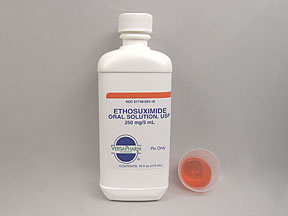
Ethosuximide Coupons & Savings Card – Discount Prices from $37.79
Generic for: Zarontin
My prescription
Edit
473ML of 250MG/5ML, Ethosuximide (1 Bottle)
Select pharmacy

CVS
$37.79
COUPON PRICE
Walmart
$40.92
COUPON PRICE
Walgreens
$50.62
COUPON PRICE
Albertsons
$60.13
COUPON PRICEEthosuximide savings card
Show this card to your pharmacist
CVS
$37.79
BIN
ID
PCN
GRP
019876
LHE676D006
CHIPPO
LHX
Powered by
More prescriptions for epilepsy
More prescriptions for epilepsy
Price history for Zarontin (brand) & Ethosuximide (generic)
1 Bottle, 473ML of 250MG/5ML
Average retail price for Zarontin
Average retail price for Ethosuximide
Average SaveHealth price for Ethosuximide
Our price history data is based on aggregated prescription data collected from participating pharmacies in America. Our prescription data updates daily to reflect the latest price changes. If you notice a missing data point, it means there wasn't sufficient data available to generate a monetary value for that date.
We analyzed Ethosuximide prices for (473ML of 250MG/5ML, 1 Bottle) over the last 12 months. The average retail price was $161.20, while the average price using the SaveHealth discount card was $108.47. That's a savings of approximately 32.71% when using our Ethosuximide coupon.
Compared to the generic version, Zarontin had an average price of $269.47 over the same time period. With the SaveHealth savings card, Ethosuximide is 59.75% cheaper on average than Zarontin.
*Retail prices are based on pharmacy claims data, and may not be accurate when we don't have enough claims.
Ethosuximide dosage forms
Dosage Quantity Price from Per unit 1GM 1 Bottle $1.01 $1.01 1GM 2 Bottles $1.55 $0.78 1GM 3 Bottles $11.81 $3.94 473ML of 250MG/5ML 1 Bottle $37.79 $37.79 473ML of 250MG/5ML 2 Bottles $65.28 $32.64 473ML of 250MG/5ML 3 Bottles $84.76 $28.25
| Dosage | Quantity | Price from | Per unit |
|---|---|---|---|
| 1GM | 1 Bottle | $1.01 | $1.01 |
| 1GM | 2 Bottles | $1.55 | $0.78 |
| 1GM | 3 Bottles | $11.81 | $3.94 |
| 473ML of 250MG/5ML | 1 Bottle | $37.79 | $37.79 |
| 473ML of 250MG/5ML | 2 Bottles | $65.28 | $32.64 |
| 473ML of 250MG/5ML | 3 Bottles | $84.76 | $28.25 |
